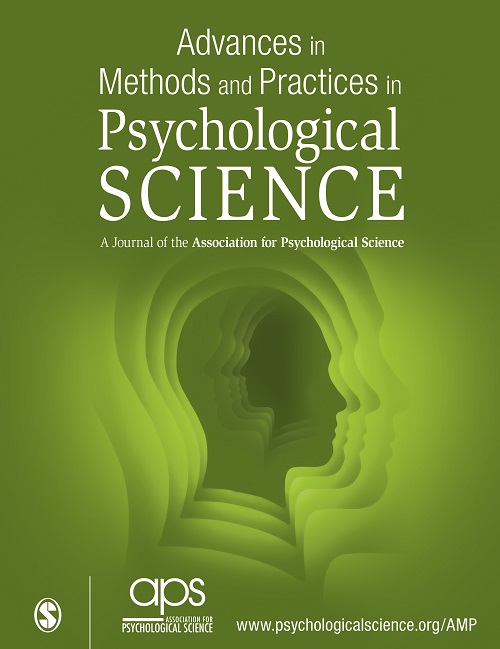How Do Science Journalists Evaluate Psychology Research?
IF 13.4
1区 心理学
Q1 PSYCHOLOGY
Advances in Methods and Practices in Psychological Science
Pub Date : 2023-07-01
DOI:10.1177/25152459231183912
引用次数: 1
Abstract
What information do science journalists use when evaluating psychology findings? We examined this in a preregistered, controlled experiment by manipulating four factors in descriptions of fictitious behavioral-psychology studies: (a) the study’s sample size, (b) the representativeness of the study’s sample, (c) the p value associated with the finding, and (d) institutional prestige of the researcher who conducted the study. We investigated the effects of these manipulations on 181 real journalists’ perceptions of each study’s trustworthiness and newsworthiness. Sample size was the only factor that had a robust influence on journalists’ ratings of how trustworthy and newsworthy a finding was; larger sample sizes led to an increase of about two-thirds of 1 point on a 7-point scale. University prestige had no effect in this controlled setting, and the effects of sample representativeness and of p values were inconclusive, but any effects in this setting are likely quite small. Exploratory analyses suggest that other types of prestige might be more important (i.e., journal prestige) and that study design (experimental vs. correlational) may also affect trustworthiness and newsworthiness.科学记者如何评价心理学研究?
科学记者在评估心理学发现时使用了哪些信息?我们在一个预先注册的对照实验中通过操纵虚构行为心理学研究描述中的四个因素来检验这一点:(a)研究的样本量,(b)研究样本的代表性,(c)与发现相关的p值,以及(d)进行研究的研究人员的机构声望。我们调查了这些操作对181名真实记者对每项研究的可信度和新闻价值的看法的影响。样本量是唯一对记者对一项调查结果的可信度和新闻价值产生重大影响的因素;较大的样本量导致在7分制上增加约三分之二的1分。大学声望在这种受控环境中没有影响,样本代表性和p值的影响也没有定论,但在这种环境中的任何影响都可能很小。探索性分析表明,其他类型的声望可能更重要(即期刊声望),研究设计(实验性与相关性)也可能影响可信度和新闻价值。
本文章由计算机程序翻译,如有差异,请以英文原文为准。
求助全文
约1分钟内获得全文
求助全文
来源期刊
CiteScore
21.20
自引率
0.70%
发文量
16
期刊介绍:
In 2021, Advances in Methods and Practices in Psychological Science will undergo a transition to become an open access journal. This journal focuses on publishing innovative developments in research methods, practices, and conduct within the field of psychological science. It embraces a wide range of areas and topics and encourages the integration of methodological and analytical questions.
The aim of AMPPS is to bring the latest methodological advances to researchers from various disciplines, even those who are not methodological experts. Therefore, the journal seeks submissions that are accessible to readers with different research interests and that represent the diverse research trends within the field of psychological science.
The types of content that AMPPS welcomes include articles that communicate advancements in methods, practices, and metascience, as well as empirical scientific best practices. Additionally, tutorials, commentaries, and simulation studies on new techniques and research tools are encouraged. The journal also aims to publish papers that bring advances from specialized subfields to a broader audience. Lastly, AMPPS accepts Registered Replication Reports, which focus on replicating important findings from previously published studies.
Overall, the transition of Advances in Methods and Practices in Psychological Science to an open access journal aims to increase accessibility and promote the dissemination of new developments in research methods and practices within the field of psychological science.

 求助内容:
求助内容: 应助结果提醒方式:
应助结果提醒方式:


